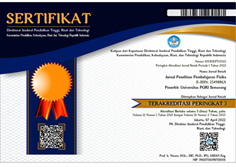Efektivitas Pembelajaran Daring Pada Materi Hukum Hooke Menggunakan LMS berbasis Edmodo
Abstract
This study aims to determine the effectiveness of online learning on hooke law material using edmodo-based lms, the method used is to analyze the questionnaire given to respondents via google form, the subject of this study is class XI SMA N 1 Lahat, this research divides 3 topics. In the survey, the use of Edmodo in terms of the aspect of ease, the use of Edmodo in terms of the aspect of language structure and use of Edmodo in terms of the aspect of presentation. Based on the survey results from the aspect of convenience in Figure 4, the data obtained respectively 3,867 - 3,8 - 3,73. Which means that it has an average in the good category. Next, the survey results from the aspect of language structure in Figure 5, respectively, obtained data from 3.8 to 3.93 - 3.73, which means that it has an average in the good category. And the survey results from the presentation aspect in Figure 6 respectively obtained data 3,867 - 3,867 - 3,93 which means that it has an average in the good category. Of the three types of surveys that have been conducted, it can be categorized that the results of this study are good, so it can be said that this research is able to increase the effectiveness of learning and is suitable for use in the learning process.
Keywords: LMS, Effectiveness of Learning Physics, Edmodo.
Full Text:
PDFReferences
A. J. Swart, “Student usage of a learning management system at an open distance learning institute: A case study in electrical engineering,†Int. J. Electr. Eng. Educ., vol. 52, no. 2, pp. 142–154, 2015, doi: 10.1177/0020720915575925.
C. Mune, C. Goldman, S. Higgins, L. Eby, E. K. Chan, and L. Crotty, “Developing Adaptable Online Information Literacy Modules for a Learning Management System,†J. Libr. Inf. Serv. Distance Learn., vol. 9, no. 1–2, pp. 101–118, 2015, doi: 10.1080/1533290X.2014.946351.
X. Hu, J. Ng, K. K. Y. Tsang, and S. K. W. Chu, “Integrating Mobile Learning to Learning Management System in Community College,†Community Coll. J. Res. Pract., vol. 44, no. 10–12, pp. 722–737, 2020, doi: 10.1080/10668926.2019.1640146.
E. L. Black and B. Blankenship, “Linking students to library resources through the learning management system,†J. Libr. Adm., vol. 50, no. 5, pp. 458–467, 2010, doi: 10.1080/01930826.2010.488587.
F. S. Anggriawan, “Pengembangan Learning Management System ( Lms ) Sebagai Media Pembelajaran Untuk Sekolah Menengah,†J. Kependidikan Penelit. Inov. Pembelajaran, no. ellis, pp. 1–10, 2009.
F. J. GarcÃa-Peñalvo and M. Alier Forment, “Learning management system: Evolving from silos to structures,†Interact. Learn. Environ., vol. 22, no. 2, pp. 143–145, 2014, doi: 10.1080/10494820.2014.884790.
Z. Nurakun Kyzy, R. Ismailova, and H. Dündar, “Learning management system implementation: a case study in the Kyrgyz Republic,†Interact. Learn. Environ., vol. 26, no. 8, pp. 1010–1022, 2018, doi: 10.1080/10494820.2018.1427115.
N. U. Ain, K. Kaur, and M. Waheed, “The influence of learning value on learning management system use: An extension of UTAUT2,†Inf. Dev., vol. 32, no. 5, pp. 1306–1321, 2016, doi: 10.1177/0266666915597546.
G. Coates, H., James, R., & Baldwin, “A critical examination of the effects of learning management systems on university teaching and learning,†ertiary Educ. Manag., vol. 11, no. 1, pp. 19–36, 2005.
S. L. Watson, W. R. & Watson, “An argument for clarity: What are learning management systems, what are they not, and what should they become? TechTrends,†vol. 51, no. 2, 2007, doi: https://doi.org/10.1007/s11528-007-0023-y.
Amiroh, “Antara Schoologi, Moddle dan Edmodo,†http://amiroh.web.id/antara- moodle-edmodo-dan-schoology, 2012. .
F. Mahnegar, “Learning Management System,†Int. J. Bus. Soc. Sci., vol. 12, no. 3, pp. 144–150, 2012.
P. Fitriasari, APLIKASI EDMODO SEBAGAI MEDIA PEMBELAJARAN E-LEARNING. 2016.
“PhET’s,†https://phet.colorado.edu/in/, 2021. .
N. Katherine Perkins, Emily Moore, A. Podolefsky, Kelly Lancaster, and C. Denison, “Towards Research-based Strategies For Using PhET Simulations In Middle School Physical Science Classes,†2011.
A. Q. Sari D. P, Achmad Lutfi, “Uji coba pembelajaran IPA dengan LKS sebagai penunjang media vistual PhET untuk melatih keterampilan proses,†J. Pendidik. sains e – pensa, vol. 1, no. 2, pp. 15–20, 2013.
M. Perkins, K. Wendy Adams, S. Dubson, Noah Finkelstein, R. Reid, and Carl Wieman, and LeMaster, “PhET: Interactive Simulations for Teaching and Learning Physics,†J. Phys. Teach., vol. 44, 2006.
Majid Abdul, Perencanaan pembelajaran: Mengembangkan kompetensi guru. Bandung: Remaja Rosdakarya.
Dharmawati., “Penggunaan Media e-Learning Berbasis Edmodo dalam Pembelajaran English for Business,†J. Sist. Inf., vol. 1, no. 1, pp. 43–49, 2017.
V. Hadi, F. R., & Rulviana, “Penggunaan Media E-Learning Berbasis Edmodo dalam Pembelajaran Geometri,†in Prosiding Seminar Hasil Penelitian dan Pengabdian Kepada Masyarakat UNIPMA, 2017, pp. 230–234.
M. Khoiroh, “Media Pembelajaran Menggunakan Edmodo.,†https://muhimatulkhoiroh.wordpress.com/2016/11/17/media-pembelajaran-menggunakanEdmodo, 2016. .
K. M. Al-said, “Students ’ Perceptions of Edmodo and Mobile Learning and their Real Barriers towards them,†TOJET Turkish Online J. Educ. Technol., vol. 14, no. 2, pp. 167–180, 2015.
Basori, “Pemanfaatan Social Learning Network ‘Edmodo’ dalam Membantu Perkuliahan Teori Bodi Otomotif di PTM JPTK FKIP UNS,†JIPTEK, vol. 6, no. 2, pp. 99–105, 2013.
L. N. Balasubramanian, K., Jaykumar, V., & Fukey, “A Study on “Student Preference towards the Use of Edmodo as a Learning Platform to Create Responsible Learning Environment,†Procedia - Soc. Behav. Sci., vol. 144, no. 2, pp. 416–422, 2014.
W. N. Herlambang, A. D., & Hidayat, “Edmodo untuk Meningkatkan Kualitas Perencanaan Proyek dan Efektivitas Pembelajaran di Lingkungan Pembelajaran yang Bersifat Asinkron,†J. Teknol. Inf. Dan Ilmu Komput., vol. 3, no. 3, pp. 180–187, 2016.
DOI: https://doi.org/10.26877/jp2f.v13i1.8028
Refbacks
Copyright (c) 2022 Jurnal Penelitian Pembelajaran Fisika

This work is licensed under a Creative Commons Attribution-ShareAlike 4.0 International License.
Attention:
Starting vol. 15 issue 4 October 2024 JP2F has moved to a new website address
https://journal2.upgris.ac.id/index.php/jp2f/index
The submission process will only be served on the web above.
Copyright of Jurnal Penelitian Pembelajaran Fisika ISSN 2086-2407 (print), ISSN 2549-886X (online)
Gedung Utama GU.2.01 FPMIPATI, Universitas PGRI Semarang
Jl. Lontar No. 1-Dr. Cipto, Kampus 1 UPGRIS, Semarang
Email: jp2f@upgris.ac.id








